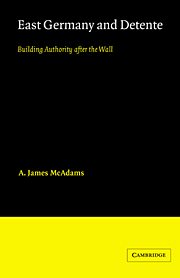4 - CRACKS IN THE MYTH OF STABILITY: 1967–1971
Published online by Cambridge University Press: 17 September 2009
Summary
The anti-detente forces of monopoly capitalism and Social Democratic politicians and ideologues in the service of the Bonn government developed concepts by which they hoped to use the tendencies toward detente in order to make the GDR's borders ‘permeable,’ to ‘overcome’ them, and to ‘open’ the country to the FRG and the other NATO states… These counter-revolutionary aims confirmed that the principles of peaceful coexistence could only be carried out in a bitter and long-lasting class struggle against imperialism.
Geschichte der SED (1978)TOWARDS A CRISIS IN IDENTITY
A psychologist once noted that only in times of crisis do individuals become aware of the complexity of their personalities. Each is ‘a combination of capacities created in the distant past and of opportunities divined in the present; a combination of totally obvious preconditions developed in individual growth and of social conditions recreated in the precarious interplay of generations.’ Political regimes, too, experience crises of identity, which expose the complex foundations of their own ‘personalities,’ the tenuous accommodation of divergent internal forces and the interplay of human volition, contingency, and their surrounding environment. The blend of these diverse factors seems so satisfying and so capable of providing a coherent picture of the world and of one's place within it – satisfying, that is, until some internal contradiction or external force disrupts this complacency.
- Type
- Chapter
- Information
- East Germany and DetenteBuilding Authority after the Wall, pp. 68 - 115Publisher: Cambridge University PressPrint publication year: 1985

